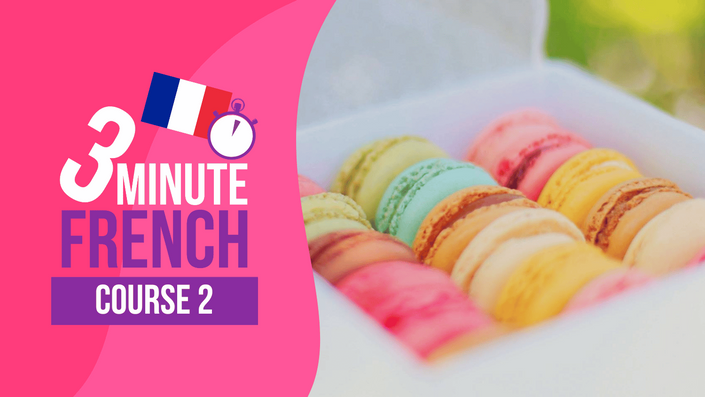
Tiny but huge: de & à
There are two tiny words in French that make a humongous impact
What do "de" and "à" mean?
The words “de” and “à” each have two meanings:
de – of / from
à – at / to
je voudrais aller à Paris – I would like to go to Paris
je suis à la plage – I am at the beach
le souvenir est de Paris – the souvenir is from Paris
c’est une bouteille de vin – it’s a bottle of wine
de vs. d'
The word “de” shortens to d’ if you place it in front of a vowel or a letter H. This is simply because it makes it easier to say:
une bouteille d’eau – a bottle of water
la voiture d’Henri – Henri’s car (the car of Henri)
Contractions with "de"
As well as shortening in front of words that start with a vowel or a H, the word “de” also joins together with some of the words for “the”.
de + le = du
de + les = des
The words “du” and “des” both mean “of the” or “from the”. The word “de” doesn’t join together with the feminine word for “the” (la), or the shortened word for “the” (l’).
de + la = de la
de + l’ = de l’
l’adresse du restaurant – the restaurant’s address (the address of the restaurant)
la nourriture des enfants – the children’s food (the food of the children)
la voiture de la femme – the woman’s car (the car of the woman)
la maison de l’homme – the man’s house (the house of the man)
Contractions with "à"
We’ve just seen that the word “de” joins together with “le” and “les” to form “du” and “des”. Well, the same thing happens with the word “à”
à + le = au
à + les = aux
The words “au” and “aux” both mean “to the” or “at the”. The word “à” doesn’t join together with the feminine word for “the” (la), or the shortened word for “the” (l’).
à + la = à la
à + l’ = à l’
je suis au restaurant – I’m at the restaurant
je voudrais aller au restaurant – I would like to go to the restaurant
je suis aux magasins – I’m at the shops
je voudrais aller aux magasins – I would like to go to the shops
nous sommes à l’hôtel – we are at the hotel
nous allons à la plage – we’re going to the beach
Some & any
There’s another interesting and useful thing that happens with the word “de” in French. If you place the word “de” in front of any word for “the” in French, you get the word for “some” or “any” (it’s the same word in French). And don’t forget about the “de” contractions (du & des).
du pain – some bread / any bread
des voitures – some cars / any cars
de la dinde – some turkey / any turkey
du sucre – some sugar / any sugar
des tables – some tables / any tables
de la viande – some meat / any meat
Let's practise
Have a go at saying the sentences below in French. Firstly, here’s some vocabulary you may need:
I’m going – je vais
I am – je suis
it is – c’est
is – est
I would like – je voudrais
there is / there are – il y a
do you have – avez-vous
the hotel – l’hôtel
the restaurant – le restaurant
the shop – le magasin
the supermarket – le supermarché
the beach – la plage
the bread – le pain
the wine – le vin
the turkey – la dinde
the car – la voiture
here – ici
the table – la table
the food – la nourriture
the meat – la viande
- I’m at the restaurant now
- I’m going to the beach
- I’m going to Paris
- It’s from the supermarket
- Do you have any sugar?
- I would like some turkey
- The wine is from the hotel
- I would like some bread
- I’m at the supermarket
- The wine is from Bordeaux
- I would like some wine
- Do you have any meat?
- There are some tables here
- The wine is from the restaurant
- There is some wine here
- Do you have any bread?
- There are some cars here
- There is some food here
- It’s from the shop
- I’m at the beach
- I’m going to the hotel tomorrow
- It’s from Marie
- I’m going to the shops
- There is some water here
- There is some sugar here
ANSWERS
- Je suis au restaurant maintenant
- Je vais à la plage
- Je vais à Paris
- C’est du supermarché
- Avez-vous du sucre?
- Je voudrais de la dinde
- Le vin est de l’hôtel
- Je voudrais du pain
- Je suis au supermarché
- Le vin est de Bordeaux
- Je voudrais du vin
- Avez-vous de la viande?
- Il y a des tables ici
- Le vin est du restaurant
- Il y a du vin ici
- Avez-vous du pain?
- Il y a des voitures ici
- Il y a de la nourriture ici
- C’est du magasin
- Je suis à la plage
- Je vais à l’hôtel demain
- C’est de Marie
- Je vais aux magasins
- Il y a de l’eau ici
- Il y a du sucre ici
In context
It’s always good to look at rules in context, because it helps to solidify them in your mind. So, let’s read through a few paragraphs from Jeanne-Marie LePrince de Beaumont's version of the fairy tale, “La Belle et la Bête”, or, “Beauty and the Beast” in English. We’ll focus on any instances of “à” and “de” that we see:

LA BELLE ET LA BÊTE
Il était une fois un marchand très riche. Il avait six enfants, trois garçons et trois très jolies filles. La cadette était si belle et si intelligente qu’on la surnomma dès son enfance La Belle enfant. Ses sœurs en étaient très jalouses. Elles avaient beaucoup d’orgueil, passaient leurs journées au bal ou au théâtre et à se moquaient de Belle, qui préférait lire des livres.
La richesse de la famille étant connue de tous, plusieurs prétendants demandèrent les jeunes filles en mariage. Pourtant aucun ne se révéla assez bien pour elles.
Les aînées désiraient au moins un duc ou un comte. Belle quant à elle, bien qu’elle remerciât ceux qui souhaitaient l’épouser, préférait rester encore quelques années auprès de son père.
Or, le pauvre marchand finit un jour complètement ruiné. Il ne lui restait plus qu’une petite maison de campagne. La famille s’y installa et n’eut d’autre choix que d’y travailler comme des paysans pour vivre. Alors, les jeunes hommes qui courtisaient les filles disparurent en même temps que sa fortune.
Le père et ses trois fils labouraient la terre. Belle se levait à quatre heures du matin pour nettoyer la maison et préparer le dîner pour sa famille. En à peine deux mois, elle s’était pleinement habituée à sa nouvelle vie et dès que ses corvées étaient terminées, elle se plongeait dans un de ses livres.
Ses sœurs en revanche s’ennuyaient. Elles ne se levaient qu’à dix heures et passaient leurs journées à se promener et à se lamenter sur leurs beaux habits et amis passés.
Une année s’écoula ainsi et un beau jour, le marchand apprit le retour inespéré d’un navire qui transportait des marchandises lui appartenant. Tandis qu’il se préparait à se rendre en ville afin de récupérer l’argent de la vente, ses filles aînées lui réclamèrent nombre d’habits de toutes sortes. Belle garda le silence, certaine que l’argent récolté ne pourrait couvrir les seuls frais des cadeaux de ses sœurs.
beaucoup d’orgueil – a lot of pride
au bal ou au théâtre – to the ball or to the theatre
lire des livres – read some books
la richesse de la famille – the wealth of the family
connue de tous – known by all
au moins un – at least one
quant à elle – according to her
auprès de son père – next to her father
une petite maison de campagne – a small country house (house of country)
à quatre heures du matin – at four in the morning
habituée à sa nouvelle vie – used to her new life
un de ses livres – one of her books
à dix heures – at ten o’clock
le retour inespéré d’un navire – the unexpected return of a ship
des marchandises – some goods
l’argent de la vente – the money from the sale
nombre d’habits de toutes sortes – number of clothes of all sorts
frais des cadeaux de ses sœurs – cost of the presents of her sisters
Get three courses in one bundle, and save money
-

Courses 1, 2 & 3
Get this bundle -

Courses 4, 5 & 6
Get this bundle -

Courses 7, 8 & 9
Get this bundle
Course 2, Building Structures and grammar courses
-

Course 2
Get this course -

Building Structures
Get this course -

Quick Guide
Get this course
All my French courses

Building Structures in French
Quick Guides
French grammar
Essential French grammar - Future | Conditional | Imperfect
All my Spanish courses

Building Structures in Spanish
Quick Guides
Spanish grammar
Essential French grammar - Future | Conditional | Imperfect
All my German courses

Building Structures in German
Quick Guides
German grammar
Essential French grammar - Future | Conditional | Imperfect
All my Italian courses

Building Structures in Italian
Quick Guides
Italian grammar
Essential French grammar - Future | Conditional | Imperfect
All my Portuguese courses

Building Structures in Portuguese
Quick Guides
Portuguese grammar
Essential French grammar - Future | Conditional | Imperfect






